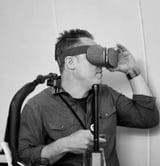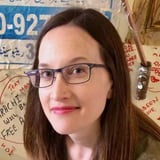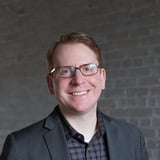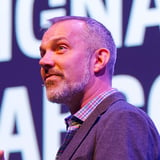Summary
Phil Gilbert outlines IBM's ambitious design transformation over two and a half years, aiming to embed a culture of design across 380,000 employees. He introduces the 'culture quotient' framework, emphasizing artifacts created by behaviors, the degree to which the culture embraces them, and duration of that embrace. IBM’s approach includes hiring over 450 formally trained designers, building relationships with top design schools like SCAD and RISD, and surrounding junior hires with experienced design leads such as Doug Powell and Denise Burton. Gilbert highlights the creation of rigorous intern programs led by Devon O’Brien from SCAD and the development of IBM Design Thinking as a lightweight, collaborative practice empowering multidisciplinary teams including product managers and engineers. Instead of a top-down mandate, IBM adopted an opt-in approach, accelerating early success and sustainable adoption. They also introduced a design language that balances consistency with implementation freedom, and purpose-built flexible design studios like the Austin location, encouraging movement and collaboration. Global studios in Germany, England, China, and other locations form a network unified by digital tools and collaboration platforms. Gilbert closes with cultural notes on change as a constant, unity without uniformity, and the importance of empowerment, collaboration, and the willingness to fail gracefully, validated by devotion from leadership including CEO Ginni Rometty.
Key Insights
-
•
Design culture can be understood and shaped using a culture quotient formula: artifacts created × level of cultural embrace × duration of embrace.
-
•
IBM set an ambitious goal to hire 1,000 formally trained designers within five years, hiring over 450 in two and a half years.
-
•
IBM emphasizes 'people plus practices plus places = artifacts' to generate meaningful design outcomes.
-
•
IBM Design Thinking is a lightweight practice focusing on collaboration around artifacts, not rigid processes.
-
•
An opt-in approach to embedding design thinking helped IBM accelerate early wins, avoiding top-down enforcement.
-
•
IBM built deep relationships with top design universities to recruit diverse new talent directly from schools such as SCAD, RISD, and Stanford D-School.
-
•
IBM created formal career paths for designers parallel to engineering, including Distinguished Designer and Design Principal levels.
-
•
IBM’s design language focuses on giving broad guidance instead of rigid pattern libraries, encouraging implementation freedom and evolution.
-
•
The Austin design studio was purpose-built with movable walls and spaces to foster dynamic, radical collaboration and creativity.
-
•
The program’s success depends on empowering not only designers but all IBM employees to become design thinkers who opt into the culture.
Notable Quotes
"We could create a sustainable culture of design and use it as our leading edge weapon of transformation."
"Culture isn’t just behavior over time, it’s the artifacts that culture creates and embraces over time."
"People plus practices plus places equals artifacts."
"IBM Design Thinking is about collaborating around artifacts and frameworks, not prescribing the process teams must follow."
"We decided to make it an opt-in program and that accelerated early wins and self-selected positive outcomes."
"Design thinking is the scientific method for the 21st century."
"We had an engineering culture that confused uniformity with design, and consistency with design."
"Our design language gives broad ditches on either side of the road with some nuance, but no rigid libraries at first."
"The Austin studio’s walls can be put up and taken down by a 90-pound person on a Home Depot shopping cart."
"We’re showing people how to collaborate like crazy and how to fail gracefully."
Or choose a question:
















More Videos

"Frequent, bite-sized training is crucial so staff actually remember how to support customers with disabilities."
Sam ProulxOnline Shopping: Designing an Accessible Experience
June 7, 2023

"We’ve had to retire the studio development category because it wasn’t prioritized due to project work demands."
Ignacio MartinezFair and Effective Designer Evaluation
September 25, 2024

"Using program dollars to hire freelancers helped me avoid difficult conversations with HR and finance early on."
Sarah Kinkade Mariana Ortiz-ReyesDesign Management Models in the Face of Transformation
June 8, 2022

"The Shakers’ principled approach to design was a precursor to Bauhaus’s form follows function and today’s user-centered values."
Daniel GloydWarming the User Experience: Lessons from America's first and most radical human-centered designers
May 9, 2024

"We’re moving from theory of change to theory of service: starting with what people actually need before creating anything."
Patrick BoehlerFishing for Real Needs: Reimagining Journalism Needs with AI
June 10, 2025

"Providing stakeholders with real user voices alongside insights is key to internalizing and acting on research."
Andy Barraclough Betsy NelsonFrom Costly Complexity to Efficient Insights: Why UX Teams Are Switching To Voxpopme
September 23, 2024

"Standard design research looks for pain points, not harms, and harms often cannot be identified in typical user research."
Alexandra SchmidtWhy Ethics Can't Save Tech
November 18, 2022

"If you don’t have any conflict, that means you have no trust."
Louis RosenfeldDiscussion: What Operations can teach DesignOps
November 6, 2017

"We’re literally using AI to help AI build AI, including bias detection and correction in the process."
Mitchell BernsteinOrganizing Chaos: How IBM is Defining Design Systems with Sketch for an Ever-Changing AI Landscape
September 29, 2021
















